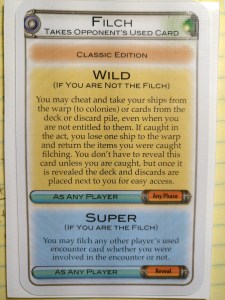Cheating in games
July 21, 2018
Recently, I found an interesting post on the game design reddit page (here), and made a quick comment. Essentially, the poster wanted to know whether cheating in games was a failure of design.
Here is what I posted in response:
“Funny story. I had a group of friends and we used to play a lot of Hearts (the 52 card trick-taking game). When we started to get sick of playing, my friend invented a game called Cheating Hearts. The rules were the same as the rules to Hearts, except that all players were allowed to cheat. If you got caught you had to undo whatever cheating you did, but if you didn’t get caught you got away with it. Also, if you cheated you had to reveal that you did at the end of the game. This led to some hilarity and a great deal of fun because thinking of ways to cheat without getting caught was actually quite difficult. There’s a couple of games I can think of that actually acknowledge cheating- like Cosmic Encounter’s classic Filch flare (for those who don’t know, the card roughly reads, “You may cheat if this card is in your hand, but every time you get caught you have to reveal this card, undo the cheating, and take a small penalty.”)
If done right, I think that cheating can actually be a fun mechanic that adds to a game. It can definitely become a problem in more serious strategy games, but especially among casual or social multi-player games, it can be a feature and not a bug :).”

I think that in general, cheating is kind of like lying. You agree to certain rules before you play any game, and breaking them to get an advantage usually makes the game less fun for the other people who play since they can’t compete with you on a fair level. Cheating might also diminish your accomplishment in the sense that it wasn’t truly your skill that made you win, but some outside bonus (similar to an athlete being busted for steroid use). I think that most people look down on cheating and probably don’t want to play games with people who cheat.
However, if cheating is a rule, then things get interesting. I don’t think I would incorporate this into Dagers High, but I think it would be interesting to design a game where players can “cheat”, but have to do it in a way where they do not get caught. Not only is there a certain exhilaration to cheating, but cheating itself is a skill that requires some creativity and cunning. I think that this is why people generally react positively to stories of card counters beating the house at blackjack, for example.
After looking a bit online, I found a couple of interesting games that actually already encourage players to cheat:
“Cheating Monopoly”: Based off of a survey that revealed that almost half of people have cheated at Monopoly, Hasbro released a version of Monopoly with special cheating cards that reward players for cheating and getting away with it.
Illuminati: The rulebook details ways in which players may cheat at the game in a special variant, and details which forms of cheating are not allowed because they would slow down the game too much, etc.
Sherrif of Nottingham: The whole premise of this game is that players should bribe the sheriff in order to gain an advantage.
There were a lot more than I thought I would find, and there are a few more examples contained in this reddit post. So maybe cheating isn’t so taboo after all? Let me know what you think in the comments! Also, you can now subscribe by using the widget on the sidebar to your right!